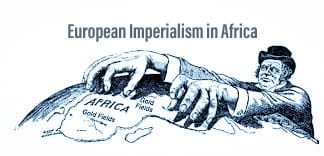Throughout most of the African continent’s history, its interior and southern region had remained unmapped and was mostly unknown to rest of the world. Briefly empires such as the Romans would exert influence on the Northern African region but never ventured to the South mainly due to the geographical barrier of the Sahara. All that changed during the age of European exploration, as a cycle of slave trade, war and ultimately colonization would plague the African continent for centuries to come. Europeans made various economic policies that devastated the colonies in the name of easing trade and spreading Christianity. Imperialists settled with the optimist claims that they are there to civilize colonies, establish a free trade-based market to benefit everyone, etc. But rather than giving the locals any benefit, imperialists had always sought to take personal gains out of the rich African heartland such as rubber, palm oil, minerals, and diamonds. European Imperialist powers had no concern about preserving African culture as it was all about political, economic, and social dominance with cultural imperialism officially known as the “Scramble for Africa.”
Effects of Imperialism
The negative effects of European Imperialism were clearly visible during colonization and yet remain even after the independence as the current borders were originally drawn by the same Europeans. Imperialists took over 90% direct hold of African land and started to bleed African resources for purpose of European progression. Much worse they not only took land but also chose to make enslaved Africans work in inhumane working conditions for profit. Even after enslavement abolition, free labor was extracted in form of colonial tax and other policies. As for the land grab race, it was done to meet the European heartlands growing demand for agriculture as the European land was being utilized for industrialization. At the end most of Africa’s land was divided over by 14 European nations within the Berlin conference (1884-1885) most notably Britain, Belgium, Germany, and France. Belgium was given vast lands from Africa that make up the Democratic Republic of the Congo presently. Britain snatched vast lands of South Africa, Kenya, and later other parts of Africa. This scrabble was fueled by the need for agriculture and materials for the European economy.
As soon as Europeans started settling companies and agricultural farms were established which ultimately had a need for (cheap) labor. They needed inexpensive employment. They fulfilled this need for labor arose. They needed inexpensive workers for the sake of more profit, which they fulfilled by utilizing Africans slaves or even free citizens as workers at a very cheap rate. The Native Africans to whom these lands belonged had two options: either to give up their land to Europeans or live their lives under constant threats and misery. As a result, many Africans straight up left their lands and moved to other places they thought not reachable by the foreign invaders causing overcrowding and famine in some areas. As for the workers their employment circumstances were very bad and unsafe. If anyone refused to work, punishment awaited such as cutting of fingers or whole limbs (in case of Belgium). On the other hand, if the workers complied but made any mistakes, they were given even lower wages and worked even harder.
The Europeans back at home required a constant source of resources and to manage their government facial polices/growth, imperialists left very little to the colonies bleeding them dry. Meanwhile to run their own local governments, they forced tax laws on the local Africans. Especially after the great war, the economies of major European countries were in ruins. To offset the damage and speed up recovery imperialist powers took benefit from African countries in form of increased taxes and labor. The Europeans justified this claiming that they had made sacrifices in defending said colonies hence its natural the subjects pay back.
Since at this point it was made mandatory for all able-bodied Africans to work; many Africans men had to leave their families behind to work in either large labor camps or serve as soldiers. This had a very catastrophic long-term disaster in form of famine as at that time, only men used to work to support the local communities but as they had left no one was present to keep local communities’ running. As a result, the Africans economy and everything was devastated. The fact that the imperialist occupiers had modified the economics infrastructure of Africa to suit their own need did not help with containing the famine. The imperialist governments had started producing cash crops to fulfill industrial requirements of Europe. Many cash crops like coffee and cotton were manufactured extensively instead of producing crops for basic requirements of local Africans for their food resulting in even more famine. Overall, the labor was done by Africans, but the fruit of their labor crops were enjoyed by their imperialist overlords. Africans have no control over their decision making, fully dependent on the will of their occupiers. They were not even permitted to cultivate food for themselves or trade with each other, inhumanly enforced to export all their fruit of labor. So, at the very start Europeans would rely on slave trade buying slaves from Africa, selling them in the Americas and bringing back valuable commodities to sell at premium. Later, after abolition of slavery, imperialists turned to tax, labor, and land. The resources would get pumped out of Africa at cheap rates and used on premium cost to purify or create products. Later the surplus would be brought back to Africa and sold at a very high rate. As Africans became poorer, they could not buy those products and as a result overall economic activity declined.
Overall, the European imperialists did not come to colonize Africa to modernize them, promote fair trade or spread religion. Their primary motivation was to take advantage of the Africans inability to defend themselves and get unrestricted access to the vast resources such as minerals, metals, cash crops, diamonds and more importantly cheap labor as a result living conditions for locals dropped, many lost their freedom, the local economies got destroyed, multiple cases of famine endured and worse the locals lost their freedom to live as humans, instead treated as mere statistic.
Positive Effects
While over all the negatives far outweigh any positives imperialism ever brought to the African continent there were some undeniable pros. If Africa was not colonized, it would to most likely be lagging far behind the world in terms of infrastructure and political development. Colonization had taught them the importance of education, enhanced their overall infrastructure, brought political reforms to unite million who otherwise would be mere tribes and improved technological understanding. Advancement in medicine is also another pro as many African origin diseases had no cure prior to European intervention. Without that advancement into medicine, the modern Africans population could have had to face more pandemic at an alarming level such as the Ebola. Africans were given the concept of government structure by their imperialist’s overloads. Europeans also initiated projects to make roads and settled railway tracks between important population centers. Europeans gave them the infrastructure to utilize electricity and modern communication techniques as well. Their missionaries enhanced literacy rate and spread more religions in Africa. And finally reminded the people
how precious independence/unity truly is something that is a direct catalyst for the African union organization.
Conclusion
Imperialism destroyed whole African communities and empires under the excuse of spreading technology, trade, and peace via religion. The colonization drive had brought endless suffering to multiple generations of Africans as they were forced to endure famine, give up their land, their freedom and right to resources. All this because of European greed and drive to obtain more wealth than their competitors. It is without doubt that European imperialism was cruel exploitation and has left a deep stain on the African continent for centuries to come.
Author: Sajjal Amir
About Author: Sajjal Amir is studying BS International Relations at National University of Modern Languages. She has keen interest in diplomacy, Middle eastern politics, and history.
Note: The views expressed in this article are the author’s own and do not necessarily reflect the editorial policy of Pakistan Strategic Forum.
#TeamPakistanStrategicForum






